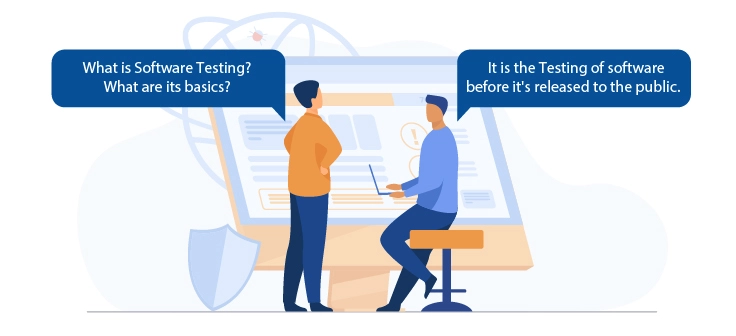 Jon Baleva
Dec 05, 2024
Jon Baleva
Dec 05, 2024

No matter how much of a perfectionist you are, humans are bound to make mistakes. Have you ever wondered how software development companies manage to deliver quality-controlled products without any defects? For some companies, success revolves around the regularity of outcomes with expected results. But before reaching its goal, every firm has to face the consequences of human error.
With the progress of today's world of technology, there is ample room for Testing to improve software reliability and high-quality applications. Software testing makes it possible to define the test environment, develop test cases, write scripts, analyze test results, and submit defect reports. In this blog, we will dig deep into the basics of software testing and all you need to know about it.
According to recent surveys, the software testing market has surpassed USD 40 billion and is projected to grow by 7% by 2027. The software tester skill set offers high salaries, worldwide recognition, and abundant growth opportunities.
Software testing is the process of evaluating and verifying a software application's functionality to find whether developed software matches its expected requirements. It identifies the defects, missing needs, and gaps and ensures that the final product is error-free. With Software Testing Course, you can become a professional who can identify inadequacies, errors, or missing software requirements.
Traditionally, software testing was kept separate from the rest of the development. Now, many development teams conduct continuous Testing. Doing test activities earlier in the software development life cycle helps keep the testing efforts in the forefront rather than an afterthought to development.
The purpose of software testing is to verify and validate a software product. It aims to accelerate software delivery while balancing the cost, quality, and risk through examination, analysis, observation, and evaluation of different aspects of the product.
Few companies would vouch against software testing due to budget reasons, thinking it would not have significant consequences. But, to save the brand's reputation from defective software and late deliveries, software testing is an indispensable step. Companies can save millions in development and delivery if they have good testing techniques and a quality assurance process. With the increasing reliance on software across industries, there is a growing demand for professionals skilled in using software testing tools to ensure software quality.
Testing is essential because software bugs could be expensive and degrade interconnected systems and cause serious malfunctions. It is also crucial to maintain a brand image and client base. Properly tested software ensures:
An enterprise brings value and sales only when the product delivered is ideal with assured quality. It is essential to follow the software requirements to get the expected outcome to the end-users.
Users look forward to products that ensure security to rely on. Security testing is a must before making it accessible to the public. With a proper testing process, it provides a secure product that makes the customer feel safe.
Cost efficiency is one of the most important benefits of software testing. Testing can ensure quality and save money in the long run. Along the different stages of software testing, if bugs are found in the early stages, it costs much less to fix them.
The ultimate goal for a product owner is customer satisfaction. The product owner must test the software to give the expected best user experience. Being the best product in the market with an entrusted client base will produce long-term benefits.
You might be interested in what is automation testing?
According to the nature and scope of the application, there are various types of software testing, each with specific objectives and strategies. There are different testing approaches like White Box Testing, Black Box Testing, and Grey Box Testing; and different testing levels like Unit Testing, Integration Testing, System Testing Acceptance Testing. Amidst the numerous types of Testing, software testing can be broadly classified into:
Manual Testing is a type of software testing where the testers manually execute test scripts and cases without any automation tools. It is a process where humans manually verify the software quality. All the test cases are performed by a quality assurance tester manually according to the end-user perspective. Tests need to be performed manually in every environment, and the success and failure rate of every execution is recorded.
Automation testing is testing the software using automation tools to find bugs, errors and defects. It implements the entire cycle of software development in less time and provides efficiency and accuracy to Testing software. Testers execute test scripts and generate test results automatically by using automation tools like Selenium and Ranorex. Apart from all the automation, it requires some manual effort to create the initial testing scripts.
Functional Testing verifies each function of an application or software. It tests all the functionalities by providing an accurate input. Functional Testing verifies whether the actual output meets the requirement of the expected result. The main concern is testing the behavior of the software.
Non-Functional Testing refers to the various parameters such as reliability, usability, compatibility, security, and performance of the software or application. The Testing revolves around the specificity of how well the systems perform under various conditions. The main focus of the Testing is to improve the user experience on how fast the system responds to a request.
You might br interested in top software testing trends
Like any other process, the software testing process is also defined into different phases.
The planning phase allows you to collect all the required details about your product. The planning stage is where the development is determined, and impact analysis is performed. The testers create a list with the collection of tasks which is later prioritized and fixed.
Once after the planning, you have to build the foundation for Testing. It includes preparing the test environment, collecting detailed test cases, preparing test data and creating a test suite. Once the test cases are ready, tools and techniques are gathered and familiarised.
The next phase in software testing is Test Execution. It is the process of running codes and comparing them with the expected and actual results. You can execute test cases and collect results in many ways. Test scripts are performed based on the test strategy, and a note is made of all the successful and failed test cases.
The final phase of the software testing process is test closure. The team members submit the documented findings to the concerned personnel. They evaluate the completion criteria based on test coverage, quality, time, critical business objectives, and software. The software testers should mention a clear explanation of the test runs and outputs.
You might be interested in benefits of automation testing certifications
To Conclude
Software testing is an integral part of software development companies. No company can underestimate the relevance of delivering the best possible outcome to the customers. Depending on the nature and scope of the software, the type of testing procedure would vary, but you cannot neglect the process. To earn customers trust and loyalty, you must deliver a consistent and reliable product. That is why software testing is an integral part of the software development cycle.
Here is the list of other major locations where Edoxi offers Software Testing Courses
Software Testing Course in Dubai | Software Testing Course in Qatar |

SENIOR TRAINER: NETWORKING AND PROGRAMMING
Jon Baleva is an IT professional with 20 years of experience in programming and networking. He is an expert in Python & IT Security domains as well as in Operating Systems (OS). He has trained professionals and students in IT Programming courses, Microsoft Azure, Linux & MAC OS. He is also a writer who writes on tech-related topics for various tech magazines in Philippine. He is now an IT Trainer with Edoxi Training Institute, Dubai.